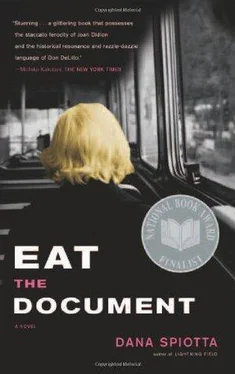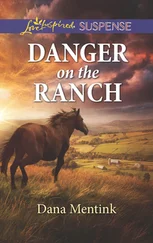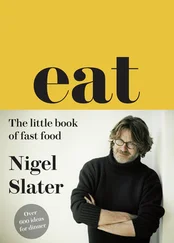Dana Spiotta - Eat the Document
Здесь есть возможность читать онлайн «Dana Spiotta - Eat the Document» весь текст электронной книги совершенно бесплатно (целиком полную версию без сокращений). В некоторых случаях можно слушать аудио, скачать через торрент в формате fb2 и присутствует краткое содержание. Год выпуска: 2006, Издательство: Scribner, Жанр: Современная проза, на английском языке. Описание произведения, (предисловие) а так же отзывы посетителей доступны на портале библиотеки ЛибКат.
- Название:Eat the Document
- Автор:
- Издательство:Scribner
- Жанр:
- Год:2006
- ISBN:нет данных
- Рейтинг книги:3 / 5. Голосов: 1
-
Избранное:Добавить в избранное
- Отзывы:
-
Ваша оценка:
- 60
- 1
- 2
- 3
- 4
- 5
Eat the Document: краткое содержание, описание и аннотация
Предлагаем к чтению аннотацию, описание, краткое содержание или предисловие (зависит от того, что написал сам автор книги «Eat the Document»). Если вы не нашли необходимую информацию о книге — напишите в комментариях, мы постараемся отыскать её.
shifts between the underground movement of the 1970s and the echoes and consequences of that movement in the 1990s. A National Book Award finalist,
is a riveting portrait of two eras and one of the most provocative and compelling novels of recent years.
Eat the Document — читать онлайн бесплатно полную книгу (весь текст) целиком
Ниже представлен текст книги, разбитый по страницам. Система сохранения места последней прочитанной страницы, позволяет с удобством читать онлайн бесплатно книгу «Eat the Document», без необходимости каждый раз заново искать на чём Вы остановились. Поставьте закладку, и сможете в любой момент перейти на страницу, на которой закончили чтение.
Интервал:
Закладка:
“He said hi. I looked at him up close, and he seemed very familiar. Somewhere behind the beard and the shaggy hair. His neck was kind of short, but he was quite striking. And so familiar.
“‘I’m Dennis,’ he said.”
“No way,” I said to Gage.
“I realized it was Dennis Wilson, the cute drumming-and-surfing Beach Boy. He sat down on the banquette across from me and put his hand on the table between us. I wasn’t hiding very well my thrill, and how extremely impressed I was that I was talking to Dennis Wilson, however barefoot and disheveled. And drunk, which I also realized. In fact, he was sort of eyeing my drink.
“‘Would you like another?’ he said.
“‘Sure,’ I said, draining my glass. ‘A grapefruit and vodka with salt on the rim.’
“‘Would you mind covering it? I’m short right now.’ I shrugged and bought us two drinks. He retrieved them from the bar but this time sat next to me, on my side of the banquette.”
“No way,” I said, whispering now. For a moment I entertained the fantasy that she was about to reveal that I was actually the love child of Dennis Wilson — no doubt one of many — thus explaining not only my sense of her caginess but also my fixation on all things pertaining to the brothers Wilson — Brian, Carl and Dennis. But of course I wasn’t born until 1983, which means I was conceived in 1982, and this story we were hearing just somehow doesn’t feel like the beginning of a three-year love affair, you know? No, it sounded like something other than that. She took another toke on her pipe. As did Gage.
“Anyway, I felt sort of bad for him. I had heard how both Dennis and Brian Wilson would go on benders for days at a time. They would tell people in bars, Hey, I’m a Beach Boy, buy me a drink. And sometimes they would even play piano for free drinks. But he didn’t say anything about the Beach Boys.”
“Are you sure it was him?” I said.
She sighed.
“Okay, okay, go on. Please.”
“There was a jukebox. He went over and put a quarter in. He asked me if I wanted to dance. That old Procol Harum song, ‘A Whiter Shade of Pale,’ started playing.”
“Wait, did he pick it or did you?”
“He did.”
“He picked a Procol Harum song. What were the other songs on that jukebox?”
“I really don’t know, Jason.”
“Then what happened?”
“He said, ‘I love this song.’
“I said, ‘What does this song mean?’
“He said, ‘It doesn’t mean anything. It feels something.’”
“Right. Wow. Did he put the moves on you?”
My mother smiled at this question. “No, not really. I mean he was probably more interested in getting drunk than getting laid.”
“Yeah, right.”
“But it was somehow a sweet moment — the afternoon light, the innocent song and this sad guy swaying with me. The world was going from bad to worse, I had been in L.A. way too long, Ronald Reagan had just become president, but America was still a place where you could dance with a barefoot rock star in a nowhere bar in the middle of a weekday afternoon.”
So there my mother was, telling me about her moment with Dennis Wilson. And my mother had no business being in L.A. in 1980 and saying she had been there too long. But what did I actually know? She graduated from college in 1972. And she had me in Washington State in 1983. So there are like eleven years I know nothing about. I recall her once saying she left California after she finished school. That she had a falling-out with her parents, and she didn’t keep in contact with them. But I don’t remember asking for any specifics. Here was a perfect opening to pin her down on some things, but I said nothing. She smiled her vague, receding smile, half apologetic, half fuzzy with substance, and the conversation was over.
Okay, so here’s the thing. You don’t question these sorts of details, why would you? But what kind of fight do you get in with your parents where you never talk to them again? And moreover, who is this woman, drinking in bars, alone, on weekday afternoons? I’m no genius about people, but something is definitely up.
Night Ops
ALL-NEW PVC-coated, pressure-sensitive, UV-resistant flexible-face vinyl. A building wrap, a bulletin. Not a billboard. This plastic hugged and clung to the brick face. And it was enormous, the whole wall of a building, with one hole for the lone window on that side. It upset Henry that they couldn’t even bother with painting anymore. The quaint ghost signs still visible fifty years later on the old brick. No, this was a computer-generated image, sleek and instantly reproducible. But not, at least, immune to the effects of a Stanley knife, a pair of decent bolt cutters, or any bladed implement. In fact, it was a fairly low-tech endeavor to cut these vinyl wraps down. But physically it was demanding — the sheer size of the job, the time constraints on accomplishing it, the low light available to do the work required — all conspired to nearly undo Henry.
Three times Henry undid their ad: the beginning of May, the end of July, and on September 3, his birthday. And three times the same ad was restored. They were in a dialogue, a private battle of wills. Go ahead, Henry thought, I got nothing but time. But it wasn’t true. Clearly they would outlast him. And what would he have accomplished? It wasn’t an appropriation. A displacement. An edit. A postmodern modification or improvement. A détournement. None of that. It was just his get-gone will. And it was his undeniable, get-gone need.
PART THREE. 1972–1973
Speck in the Cosmos
BY THE TIME the bus reached Portland, Oregon, Mary had been Caroline for two days. Caroline had pulled her newly blond hair into a low ponytail. She pulled two tendrils loose over each ear and curled them into short spirals on her finger, blasting each with hair spray. She wore large round plastic sunglasses. It was decidedly different — she and Bobby always wore similar wire-framed National Health — type glasses, her hair always center-parted and pushed flat behind each ear. A carefully executed carefree look. Mary occasionally had snuck concealer here and there, but overt makeup was plastic, frivolous and shallow. Now, as Caroline, she put on some coral lipstick and felt unrecognizably safe. And as Caroline she hitched a ride south to Eugene and got the first job she applied for, cooking in a cafe. She would have made more money waitressing, but she wanted to be on the line cooking, hidden from view. And no one wanted a Social Security card or a driver’s license or even an address or a last name. They wanted to pay you under the table, in a white envelope of cash, just like the illegal Mexicans who prepped food and washed dishes and bused tables. And the apartment wasn’t so hard either, someone looking to rent out the space over his garage, a notice tacked to the co-op’s community board. All you needed was a security deposit, no lease, no credit checks required. And there was no reason not to trust her. She was hardworking and well groomed and inconspicuously average; and at night Caroline sat up in her bed and struggled to breathe, her throat tight and hard with fear.
She saw most-wanted posters in her head, her college picture. In her dreams she ran into people she knew, classmates and neighbors. She tried to say, No I’m not her, you must be mistaken, but then she would get confused and blurt out her name. Shout it, Freya, Mary. Caroline. She dreamt of jail cells and trials. Of Fred Hampton’s mattress. She even dreamt of telling them about Bobby, betraying him and saving herself. And she would wake up disoriented and ashamed. It would confuse her for a moment; then relief would start to come as she remembered that she hadn’t been caught, that it was only a bad dream, and then horror as she realized she was in hiding; that part was not a dream but her life now. She was Caroline from Hawthorne, California. Caroline Sherman. She had had a bad relationship. She had left Los Angeles to start over. This would suffice — people would find it quite reasonable for a woman to change her life over a bad love.
Читать дальшеИнтервал:
Закладка:
Похожие книги на «Eat the Document»
Представляем Вашему вниманию похожие книги на «Eat the Document» списком для выбора. Мы отобрали схожую по названию и смыслу литературу в надежде предоставить читателям больше вариантов отыскать новые, интересные, ещё непрочитанные произведения.
Обсуждение, отзывы о книге «Eat the Document» и просто собственные мнения читателей. Оставьте ваши комментарии, напишите, что Вы думаете о произведении, его смысле или главных героях. Укажите что конкретно понравилось, а что нет, и почему Вы так считаете.












